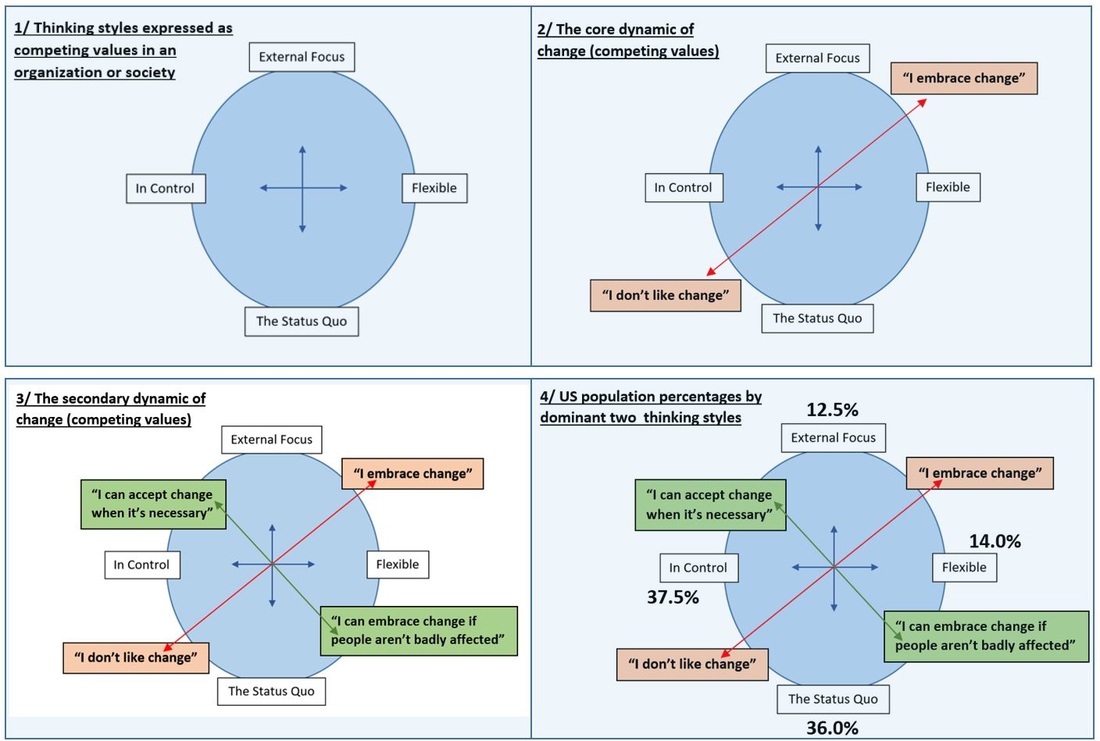How Jungian psychology helps us come to terms with this crazy world
My going in position is rooted in Carl Jung’s psychological insights. He believed (as do I) that our way of looking at things (our thinking style) is dominated by one of four core traits. Jung believed that those traits were conditioned more by our genetic make-up than by environmental factors although modern interpretations such as those developed by Dr Katherine Benziger place nature and nurture as roughly equal influences on our mature persona.
The fact remains that these four dominant traits do not appear to be equally distributed in society. Carl Jung categorized people as being first and foremost Thinkers, Intuitives, Feelers or Sensing in nature. A more modern interpretation might use descriptive phrases such as Decisive people, those who are Creative, those who trust their Feelings and those who are grounded in day-to-day life, being simply more matter of fact. Yet even when you add in a secondary influencing trait to the dominant one, it leaves us with very different proportions of people in each segment. Using statistics from Myers Briggs analyses, admittedly self-reported but representing the input from millions of respondents, we get the following results:
- Decisive, competitive creative visionaries… 13% of US population
- Creative people in touch with their feelings… 14% of US population
- Consistent, controlled people in touch with their feelings… 36% of US population
- Controlled, consistent and decisive people… 37% of US population
Over the last 30-40 years, change has certainly been rapid. Whether you consider immigration, changing family and societal values, advances in technology and all its implications, globalization and its impact on work or the type of work available, change has been too rapid and confusing for many to embrace.
Our leaders both in the political and industrial sphere have maintained an external focus on the world and adapted as needed, while demonstrating flexibility wherever possible (see top right segment of the charts). More traditional values which ensured longer term employment and gave a sense of stability have all but vanished. Stress levels and chronic disease have multiplied as people have not been able to keep up; not because they don’t want to but because it is simply not in their nature. Too much change in too short a time-span has made life too difficult and confusing, whether they have managed to keep their jobs or not. That is the true lesson for politicians.
In spite of higher levels of education and our growing internet based economy, not many have shifted from the populous left-hand quadrants to the right-hand ones, or upwards from the lower ‘stable’ side. Genetics beats out the environmental factors so it’s not surprising that people are finally protesting. They are not however demanding change; they just want life to slow down; they want to see a return to more tried and tested approaches and governments cannot simply go on saying, “the world’s changed so you have to change”. A certain number of more ‘decisive, creative visionaries’ have hijacked the majority of the population and the U.S. government in particular has let them get away with it.
To be successful, our leaders need to accept who we are and how we think; to accept that massive change takes many generations to implement and that constructive intervention is needed, not further liberalisation. When it comes to the bulk of people, The Market does not look after itself and capitalism in its current relatively unrestrained form is wounded.
No-one wants to live in a Max Weber style definition of bureaucracy where everything flows from a strict chain of command, but the majority of people do need a bit more structure in their lives, more routines and less change. They want the world to slow down and believe it’s the government’s job to help them do that.
Too many voters wish – in the words of the musical, that they could stop the world and get off. That is not possible but just maybe, in his own unique way, Donald Trump will be able to slow it down a bit.


 RSS Feed
RSS Feed